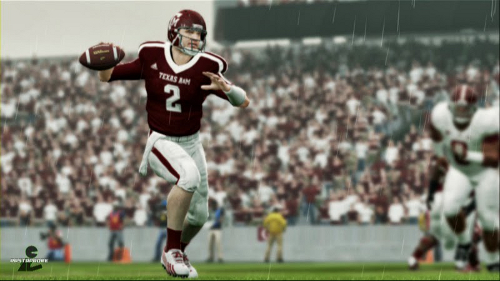Current NCAA Athlete Seeking Protection If Added to Player Likeness Lawsuit

A decision on class action certification in the player likeness lawsuit being faced by the NCAA, CLC, and Electronic Arts may still be a ways off but the wheels continue to turn in the aftermath of the hearing last month. Lawyers for the plaintiffs want protection against any retaliation towards a current collegiate athlete that would get involved in the case.
Judge Claudia Wilken has insisted that a current athlete be entered as a plaintiff now for other active or future student-athletes to become a part of the class later. This will obviously put that individual in the spotlight which will be at the very least uncomfortable for them. The lawyers want to ensure that there would be no intimidation or coercion directed at them by the defendants and an official declaration that they would not be violating any NCAA rules by doing so.
That won’t prevent them from becoming a target of those who disagree with the decision to step out on their own but it goes to show just how difficult it might be for lawyers to convince someone to do so when they have to try and get them some form of protection. The plaintiffs have until July 19 to add a current NCAA athlete to the complaint.
Earlier/Summary Below
The player likeness lawsuit against the NCAA, CLC, and Electronic Arts is the culmination of two high profile filings that were combined as led by Sam Keller and Ed O’Bannon (and O’Bannon now heads it up). It alleges improper use of player likeness through various forms of merchandise and media including video games in which the parties in question conspired to avoid paying players for their rights. Some interesting details and claims regarding the case at hand were revealed when EA was reentered as a defendant after initially being dismissed.
EA originally won a previous case regarding player likeness with the courts ruling video games are artistic works rather than commercial speech and therefore protected by the First Amendment. The Supreme Court in 2011 established forms of media, producing expressive works of art, are not subject to judgments based on incorporating someone’s name or likeness. That dismissed case however, involving Ryan Hart, has resurfaced after an appeals court reversed a decision based on that argument.
Recent uncovered emails have shown that NCAA representatives were well aware that players in games were based off real-life players. At one point the NCAA and EA had nearly reached an agreement to have actual player names included in the products. The EA Locker / Roster Share feature was a fallback option. With momentum clearly on the plantiffs’ side NCAA reps have begun to publicly express concern over the future of collegiate sports. A former EA Sports producer admitted players in NCAA games were based off real athletes.
The discovery of Tim Tebow’s name being in NCAA Football 10 could throw another wrench into EA’s series of arguments. Depositions from former Alabama wide receiver Tyrone Prothro and UConn basketball guard Tate George support the defendant’s reasoning for denying class action certification. The class action hearing resulted in the judge heavily questioning the legitimacy of a potential class and insisting a current athlete be involved.
This consolidated case in California if certified as class action would go to trial – barring a settlement – and ultimately be the determining factor of how the NCAA proceeds in the future handling broadcasting rights, merchandising, and video games. Should a negative result come down, which one analyst has pegged as being a potential loss of $1 billion for EA, it would likely not just end the NCAA Football series but also with it any realistic possibility of college sports games being made in the future. The trial now is slated to begin June 2014. Appeals following a decision could extend the fight through 2020.
